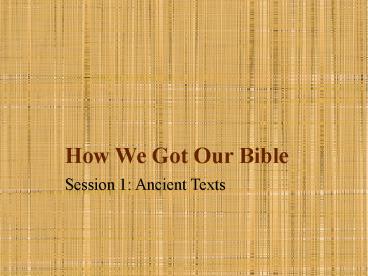How We Got Our Bible - PowerPoint PPT Presentation
Title:
How We Got Our Bible
Description:
Session 1: Ancient Texts Introduction All Scripture is inspired by God and profitable for teaching, for reproof, for correction, for training in righteousness; that ... – PowerPoint PPT presentation
Number of Views:274
Avg rating:3.0/5.0
Title: How We Got Our Bible
1
How We Got Our Bible
- Session 1 Ancient Texts
2
Introduction
- All Scripture is inspired by God and profitable
for teaching, for reproof, for correction, for
training in righteousness that the man of God
may be adequate, equipped for every good work. - 2 Timothy 316-17
3
Introduction
- What is all Scripture?
The Bible did not arrive by fax from heaven.
The Bible is a product of man, my dear. Not of
God. The Bible did not fall magically from the
clouds. Man created it as a historical record of
tumultuous times, and it has evolved through
countless translations, additions, and revisions.
History has never had a definitive version of
the book (p. 231).
4
Introduction
- What is all Scripture?
Who chose which gospels to include? Sophie
asked. Aha! Teabing burst in with enthusiasm.
The fundamental irony of Christianity! The
Bible, as we know it today, was collated by the
pagan Roman emperor Constantine the Great (p.
231).
5
Introduction
- What is all Scripture?
until that moment in history Council of Nicea,
325 A.D., Jesus was viewed by His followers as a
mortal propheta great and powerful man, but a
man nonetheless. A mortal (p. 233). Jesus
establishment as the Son of God was officially
proposed and voted on by the council of Nicaea
(p. 233).
6
Introduction
- What is all Scripture?
Anyone who chose the forbidden gospels over
Constantines version was deemed a heretic. The
word heretic derives from that moment in history.
The Latin word haereticus means choice. Those
who chose the original history of Christ were
the worlds first heretics (p. 235).
7
Introduction
- Three Links in the Chain of Communication From
God to Us - INSPIRATION
- CANONIZATION
- TRANSMISSION
8
Introduction
- Session 1
- Introduction to Course
- The Nature of the Bible
- Understanding Ancient Texts
9
The Nature of the Bible
10
The Nature of the Bible Timeline
- Zondervan NIV Atlas of the Bible, p. 216-217
11
The Nature of the Bible Timeline
- Zondervan NIV Atlas of the Bible, p. 216-217
12
The Nature of the Bible Timeline
- Zondervan NIV Atlas of the Bible, p. 216-217
13
The Nature of the Bible Etymology
14
The Nature of the Bible Makeup
From God to Us, p. 8
15
The Nature of the Bible Makeup
From God to Us, p. 9
16
Understanding Ancient Texts
17
Understanding Ancient Texts Ancient Languages
Hebrew
ltyh!Oa arB tyv!arB .Jr\ah ta_at_w ltymVh
ta_at_
18
Understanding Ancient Texts Ancient Languages
Semitic Family of Languages
A General Introduction to the Bible, Ewert, p. 40
19
Understanding Ancient Texts Ancient Languages
Greek
pa'sa grafhV qeovpneusto" kaiV wjfevlimo" proV"
didaskalivan, proV" ejlegmovn, proV"
ejpanovrqwsin, proV" paideivan thVn ejn
dikaiosuvnh/, ina artio" h\/ oJ tou' qeou'
anqrwpo", proV" pa'n ergon ajgaqoVn
ejxhrtismevno".
20
Understanding Ancient Texts Ancient Tools
21
Understanding Ancient Texts Ancient Tools
- The Text of the Old Testament, Wurthwein, p. 159.
22
Understanding Ancient Texts Ancient Tools
- The Text of the Old Testament, Wurthwein, p. 159.
23
Understanding Ancient Texts Ancient Tools
24
Understanding Ancient Texts Ancient Tools
25
Understanding Ancient Texts Ancient Tools
26
Understanding Ancient Texts Ancient Tools
27
Understanding Ancient Texts Ancient Tools
28
Understanding Ancient Texts Ancient Scribes

